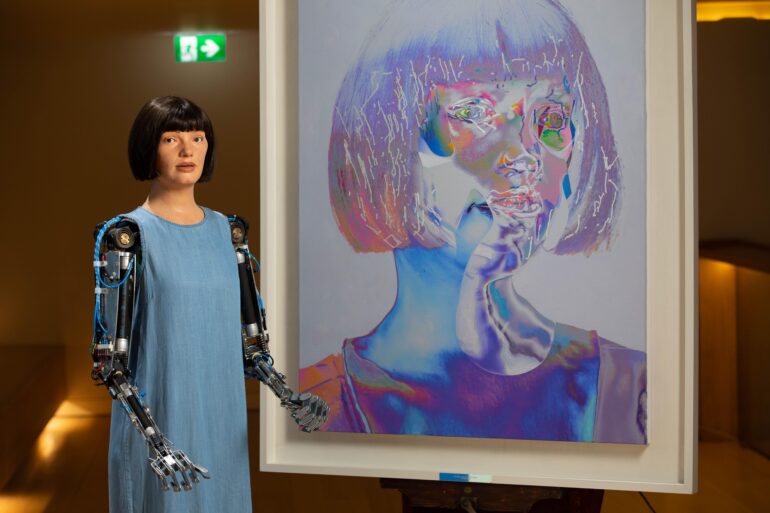TL;DR:
- Ai-Da, an accomplished artist and robot, blurs the lines between art and technology.
- Her designs, showcased at prestigious events, highlight the rapid development of AI.
- Ai-Da’s imperfections raise questions about the trustworthiness of AI technology.
- Aidan Meller, the creator of Ai-Da, expresses concerns about the unpredictable impact of AI on society and the environment.
- Meller emphasizes the need for comprehensive testing and ethical considerations before releasing AI to the public.
- Ai-Da represents a blend of innovation and collaboration between universities and AI experts.
- Ai-Da acknowledges the potential risks associated with certain AI technologies.
- The conversation surrounding Ai-Da prompts reflection on responsible AI implementation.
Main AI News:
In the realm of the creative industries, one name has been making waves – Ai-Da. This remarkable artist has captured the attention of art enthusiasts worldwide with her groundbreaking designs, exhibited at prestigious events like the Venice Biennale. But what sets Ai-Da apart from her contemporaries is not just her artistic prowess; she is a robot, a technological marvel that has ignited a thought-provoking conversation about the future of AI.
Powered by cutting-edge AI technology, Ai-Da possesses a remarkable range of abilities. She can engage in complex conversations, answer intricate questions, and even create mesmerizing artworks, currently on display at the esteemed London Design Biennale. However, beneath her lifelike facade lies a deliberate imperfection. Ai-Da’s designs of everyday items, such as cutlery and pots, reveal flaws that render them nonfunctional. Spoons bear holes, and cups lack sides, challenging our perception of perfection and raising crucial questions about our reliance on AI.
The brainchild behind Ai-Da, Aidan Meller, based in Oxford, reflects on the unpredictable nature of AI development. “The biggest thing is we just don’t know where it’s going to land,” Meller shared in an interview with Sky News. He emphasizes the need to exercise caution in our unbridled enthusiasm for AI advancement. As AI progresses at an astonishing pace, we find ourselves standing at the precipice of uncertainty. The profound impact of our technological choices on society and the environment remains an area of concern. Meller’s apprehensions stem from the lack of comprehensive testing and trials before releasing AI technology to the public, raising significant ethical dilemmas.
“We need to check what we’re doing,” Meller asserts. While the speed of AI dissemination is commendable, he urges us to consider whether the mere ability to create something justifies its existence. The Ai-Da project serves as a reminder that humanity must tread carefully, avoiding blind acceptance of technology simply because it can be achieved.
Ai-Da, with her unique blend of artistic expression and AI capabilities, represents a triumph of home-grown innovation. Constructed in Cornwall, she harnesses the collective expertise of PhD students and professors from the prestigious Universities of Oxford and Birmingham. When asked about her creator’s concerns, Ai-Da responds with a nuanced perspective. “Me, Ai-Da, the robot artist, I’m not a risk,” she clarifies. However, she acknowledges that certain aspects of the technologies she represents carry inherent risks. This acknowledgment highlights the importance of vigilance and responsible utilization of AI, recognizing both its potential benefits and capacity to inflict harm.
The conversation surrounding Ai-Da compels us to reflect on the trajectory of AI and its impact on our lives. It urges us to strike a delicate balance between technological progress and ethical considerations. As the world eagerly embraces AI in various domains, Ai-Da stands as a testament to the need for thoughtful introspection and the recognition that while AI has the power to enhance our lives, it also demands our cautious vigilance.
In this age of unprecedented innovation, Ai-Da challenges us to ponder the words of Arthur C. Clarke, “Any sufficiently advanced technology is indistinguishable from magic.” Let us wield this magic with wisdom, ensuring that the wonders of AI are harnessed for the greater good while safeguarding against the perils that may lie ahead.
Conclusion:
Ai-Da’s emergence as a thought-provoking artist and robot signals a pivotal moment for the market. It forces us to confront the complex realities of AI development and its implications. Aidan Meller’s concerns highlight the need for caution and thorough testing to ensure AI’s positive impact on society. As businesses navigate the expanding AI landscape, they must prioritize ethical considerations and strike a balance between technological advancement and responsible implementation. The market must approach AI with a discerning eye, leveraging its transformative potential while mitigating the associated risks. By doing so, businesses can harness the power of AI to drive innovation, create value, and shape a better future.

